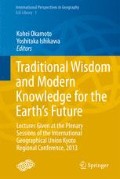Abstract
Until the nineteenth century the Japanese had no words equivalent to what in European languages would correspond to “environment” and “nature”. Japanese felt bodily united with “nature”, i.e. did not perceive the latter as a separate existence. Therefore, “environment” in the sense of “something which surrounds the human body” was for the Japanese something inconceivable. When a Japanese uses the word “environment” in an European language, he or she is conscious of a “nature” which surrounds the humans, which is subordinate to humans, and in regard of which humans are placed in an haughty position. And only when humans cease being haughty in respect of any single aspect of nature, only then “the environmental problem” in the European sense will advance in the direction of resolving.
Access this chapter
Tax calculation will be finalised at checkout
Purchases are for personal use only
References
Ayukai F (1971) Nihon Shoki Chosen Chimei Ko (The study of Korean place names in Nihon Shoki). Kokosho Kan kov Kai, Tokyo
Iwata K (1970) Kami no tanjyo (The birth of divinity). Tankousha, Kyoto
Iwata K (2005) Ki gahitoninaru, hitogakininaru (A tree becomes a person, and a person becomes the tree). JinmonShokan, Tokyo
Kawabata Y (1969) Utsukushi Nihon no watashi (Japan the beautiful and myself translated by Seidensticker, E. G. Kodansha, Tokyo
Kobayashi H (1974) Motoori Norinaga. Shincyosha, Tokyo
Mae T (2003) Tobusatate (Setting the tobusa). SunagoyaShobo, Tokyo
Mishina S (1972) Nissen Shinwa Densetsu no Ken Kyu (The study of myth and legend in Japan and Korea) Heibonsha, Tokyo
Namikawa R (1979) Wagakegonkyo (My Avatamsaka Sutra). Chobunsha, Tokyo
Nomoto K (2006) Kami to shizen no keikanron (Landscape theory on divinity and nature). Kodansha, Tokyo
Terada T (1948) Nihonjin no shizenkan (Japanese view of nature). In: Komiya T (ed) Essays of Terada Torahiko, vol 5. Iwanamishoten, Tokyo
Tokoro M (1975) Bibliography on Kiso-shiki-batsubokuunzaiZôe (The picture book on wood felling and transportation of Kiso system). Rinya kosaikai, Nagano Shibu, Nagano
Tylor EB (1871) Primitive culture. J. Murary
Umehara T (1989) Anmizmsaikou (Animism reconsidered). International Research Center for Japanese Studies, Kyoto
Yano K (1992) Isejingu no ishokujuu (Food, clothing and shelter in Ise jingo shrine). Shoseki, Tokyo
Yasuda Y (2006) Isshsinkyo no yami–Animism no futtsuken–(The darkness of monotheism). ChikumaShobou, Tokyo
Author information
Authors and Affiliations
Corresponding author
Editor information
Editors and Affiliations
Rights and permissions
Copyright information
© 2014 Springer Japan
About this chapter
Cite this chapter
Senda, M. (2014). Why There Were Not Originally in the Japanese Language Equivalents to the Words ‘Environment’ and ‘Nature’. In: Okamoto, K., Ishikawa, Y. (eds) Traditional Wisdom and Modern Knowledge for the Earth’s Future. International Perspectives in Geography, vol 1. Springer, Tokyo. https://doi.org/10.1007/978-4-431-54406-7_1
Download citation
DOI: https://doi.org/10.1007/978-4-431-54406-7_1
Published:
Publisher Name: Springer, Tokyo
Print ISBN: 978-4-431-54405-0
Online ISBN: 978-4-431-54406-7
eBook Packages: Earth and Environmental ScienceEarth and Environmental Science (R0)

